16/08/22; Global Convenience Store Focus

Interstore | Schweitzer, the retail design agency headquartered in Zurich, Switzerland, is on a mission – to identify new, innovative ways of selling.
It’s no easy task, given the global labour shortage. But Interstore | Schweitzer is able to draw on its considerable industry expertise in food retail to help retailers, both large and small, create experiences but also drive efficiencies in-store.
Food retail expertise
The company’s roots are in Schweitzer, a 100-year old family-run company from Northern Italy, which originated in refrigeration manufacture and has developed into a global leader in the shopfitting industry.
Interstore – the design arm of the business – has been developing concepts for the retail sector since 1987 and is uniquely, although not exclusively, focused on food retail design and build.
Over the last 20+ years, Interstore | Schweitzer has worked with most of the big food retailers in Europe ranging from the discount sector (Aldi, Lidl etc) to the high end (Harrods and Bonne Marche). The scale of the projects has been equally diverse, spanning very large store environments but also working at the convenience level.
Operational know-how separates the business from being simply about design, states creative director Nathan Watts. “We work closely with the client and help build store concepts in partnership,” he says.
Beni Heiden, executive creative director and head of sales, underscores the company’s production capability too. “A big part of the company is production,” he says. “We have our own production facility for cooling, wood and metal. Fifty per cent of the company is production industry – we are not just doing projects but products.”
This design expertise coupled with an understanding of the technology behind food display gives Interstore | Schweitzer an unparalleled perspective on food retailing, as Watts explains.
“We have established a holistic solution for developing stores, which touches on visual merchandising, the journey mapping of the store and how to manage different categories. We are building new innovative solutions to serve the customer in a new way.”
Self-service and flexibility
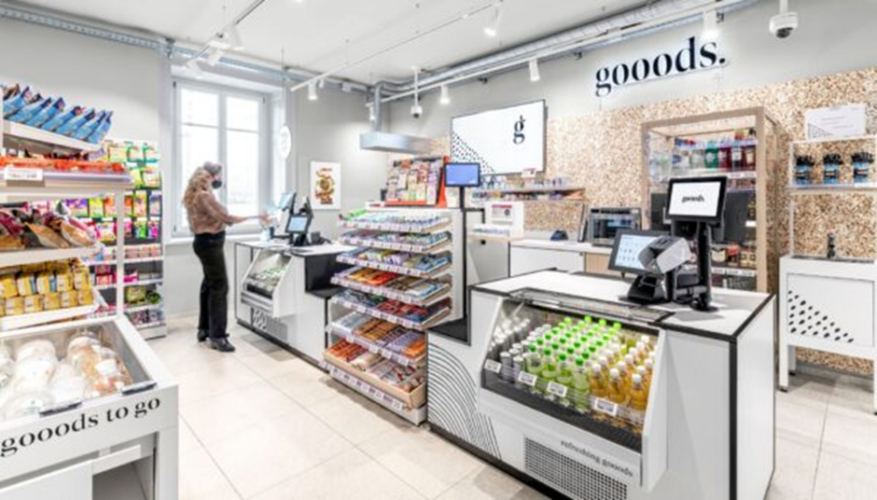
Interstore | Schweitzer’s solutions for new ways of selling revolve around how staff can best interact with customers, including innovations around self-service, says Watts. Providing flexibility to change stores more frequently is also key, he adds.
“There’s a desire for retailers to create self-service but experiential self service,” he says.
“There’s a shift away from counter service, as retailers are looking to create more efficiency in their space, which is helping to spread the cost of labour across the store.
“Self service is the way to make that happen but doing it in a way that can retain a sense of expertise,” he says.
Staff shortages and rising labour costs mean self-service has become a huge trend in fresh foods, adds Heiden.
In design terms, this means creating the feeling of a specialist environment and evoking trust but in a self-service proposition with a different assortment, different logistics, different packaging and through story telling.
Dunnes Stores in Ireland is beginning to do just that, Heiden reports.
While the retailer operates the premium James Whelan butchery concept in 25 of its 97 stores with a team of in-house butchers who prepare, cut and wrap meat in-store, it’s not viable in the rest of its estate.
To date, therefore, Dunnes Stores’ chilled meat department has been pretty much a ‘black and white experience’, says Heiden.
Working with Interstore | Schweitzer, the retailer is now looking to create more specialist self-service offers, effectively developing departments as if they were a service area but without the service.
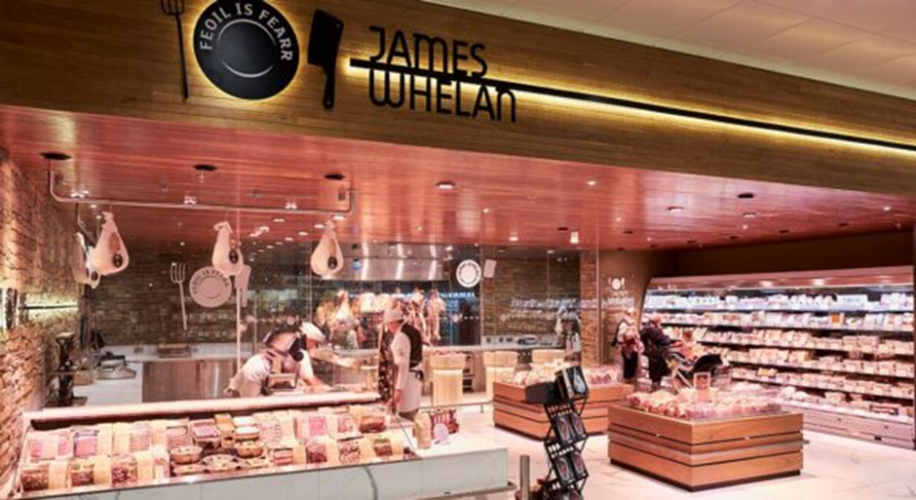
“It’s about creating a sense of destination for those departments without staff,” explains Watts. “You communicate where you can through the fixture, make more of an experience around the category and educate the shopper.”
While several retailers have been removing serve-over counters from their stores, Interstore | Schweitzer believes they are missing a trick.
“There’s a half way house retailers have not latched onto,” Watts says. “Removing those counters is a long-term trend, but they have gone directly to displaying products pre-packed. They’ve gone from one extreme to an industrialised experience but there’s a better way to manage that towards more efficient retail and this is what we have been working on quite a lot.”
Flexibility, meanwhile, is being driven by retail operators who are seeking to change their ranges and adapt to evolving consumer tastes.
Interstore | Schweitzer is helping retailers blend these new conceptual experiences with the operational components of running a store, in a similar style to a pop-up shop.
Retailers who are mastering the art of flexibility in their store formats include BRIDGE, the new store concept from Migros in Zurich (see below); Sobeys, Canada’s second largest food retailer; and Dunnes Stores in Ireland. All these retailers now have the capability to flex the size of their product offers and categories to meet customer demand.
Insight Market Focus – Zurich
Delegates attending the Insight Market Focus – Zurich, 16-18 November will be able to take in all these latest design trends and concepts with visits to the market’s latest store formats including gooods, Migros’ new lifestyle format based on healthy living; BRIDGE; Migrolino and Mio fuel sites with Shell, Socar and Micro canopies plus Valora’s foodvenience formats.
Migrolino CEO, Marcus Laenzlinger, who was recently awarded NACS Retailer Leader of the Year at the NACS Convenience Summit in Berlin, will also participate as an event host.
Interstore | Schweitzer believes Zurich is a great location to explore the future of fresh food retailing and will also be adding their expertise to the mix of visits.
Heiden suggests UK stores such as M&S and Waitrose do a great job “selling nice packaging” but lack the fresh feeling, which is noticeable in Zurich.
Watts agrees. “If you are buying lunch, you see it freshly prepared in a bowl rather than in a kitchen somewhere. That has a huge impact on how the product is presented to customers. In Zurich, when you walk into stores, ready-to-eat, freshly prepared food is a prominent aspect of the store. The focus on those categories is a huge difference,” he says.
Gooods
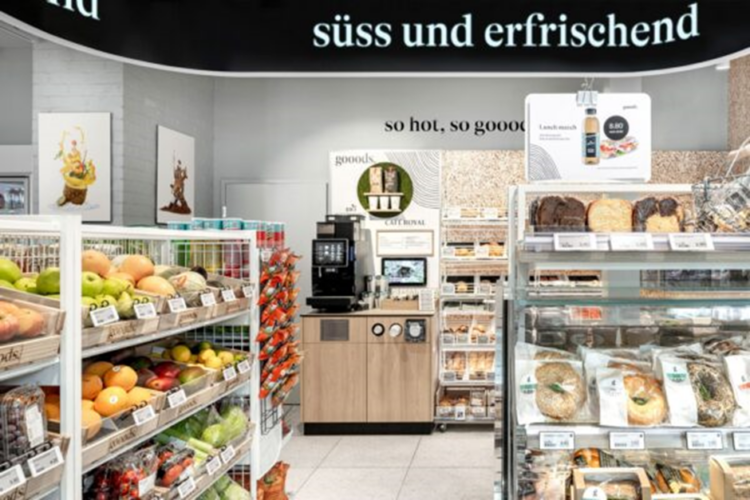
Migros’ subsidiary Migrolino, which operates 270 convenience stores in Switzerland, teamed up with Interstore | Scheitzer to develop the new gooods store format.
Focused on good taste and healthy living, gooods is designed to appeal to a different customer base to the established Migros convenience stores, which tend to be more masculine in style with darker store environments and offer fewer fresh foods.
Gooods, by contrast, provides a bright and uplifting atmosphere with a modern look and feel. The offer, meanwhile, is focused on healthier products, sustainable coffee plus unpackaged goods and is deliberately designed to appeal more to women.
“Migrolino was missing a target customer because it doesn’t give the impression of healthy, fresh or women,” states Heiden.
As such, the gooods concept has been developed from scratch with a distinct brand identity. A prototype store was opened at Zurich’s Tiefenbrunnen railway station in September last year. Since then, two more stores have been added and gooods is fast establishing itself as an independent store format with its 120-200sq m footprint ideally suited to high transient locations.
Bridge
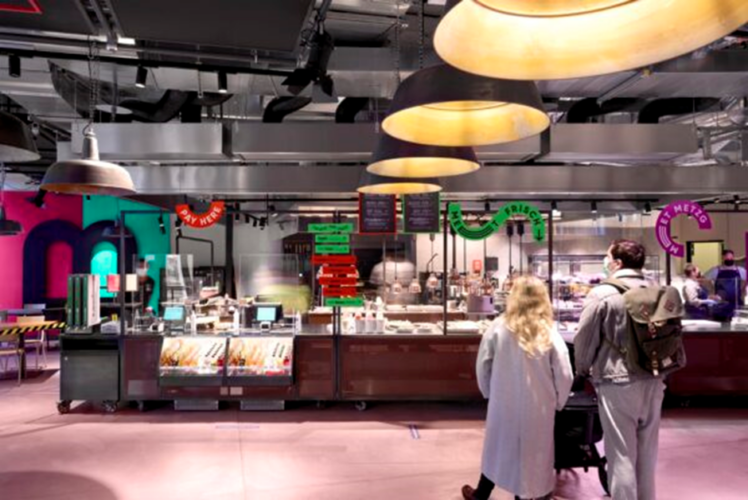
BRIDGE, another new format store from Migros, combines gastronomy and retail in one space and is also a venue for events.
According to Heiden, BRIDGE is viewed a lab space for Migros, which enables the company to test out new concepts including new food ideas and start-ups.
“They test them and, if they work they can stay for a certain time. If they are successful, they are integrated into the big machine – Migros stores,” he says.
Fifty per cent of the space is dedicated to gastronomy and there is seating for 250 people. Customers select from a range of different food stations, choose a table and order from their phones.
BRIDGE has nailed the gastronomy and events side of its business but the grocery element still needs work, Heiden reports.
“They are working on the grocery part. You can’t do a full basket shop just yet but it will take three years to get the balance between food, meet and gastronomy,” he says.
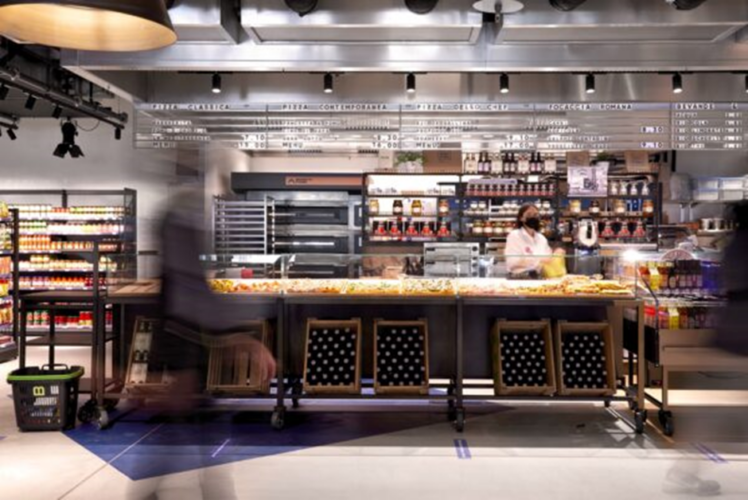
From a design perspective, a key part of the BRIDGE concept is setting up the store to enable frequent change. “From the beginning BRIDGE has been set up as a fully flexible store – a concept where all the fixtures are on wheels, except for one small area,” says Watts.
He likens the concept to a pop-up store, where the retailer can continually bring in new products and adapt the offer.
It’s a winning formula. By translating the motto “meet food, meet market, meet people” into reality, BRIDGE has become a new meeting place for young, food lovers in the centre of Zurich.
Subscribe to our free mailing list and always be the first to receive the latest news and updates.
